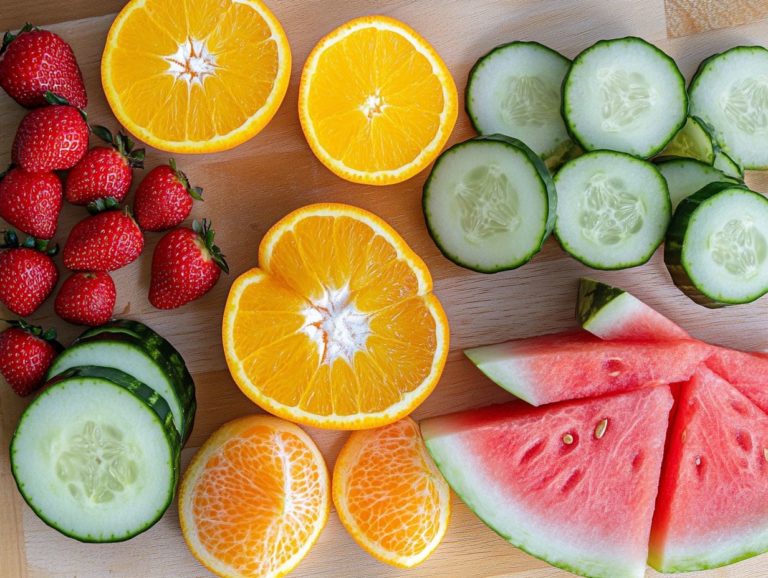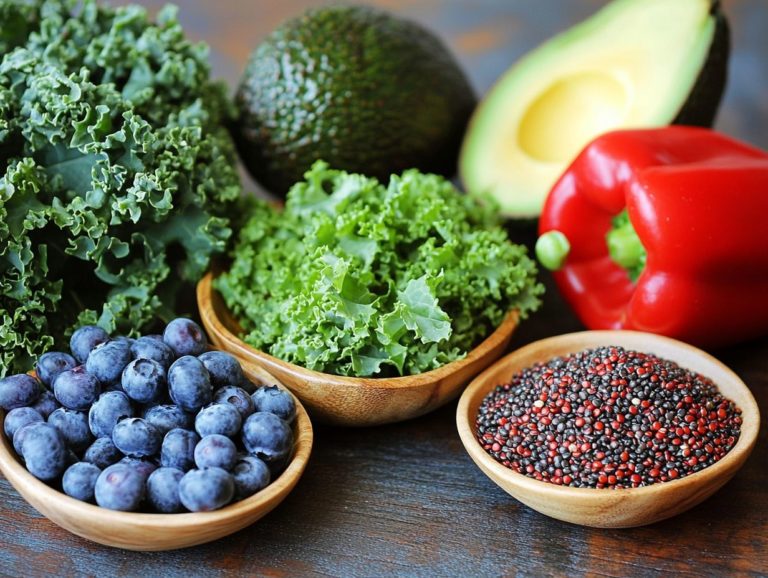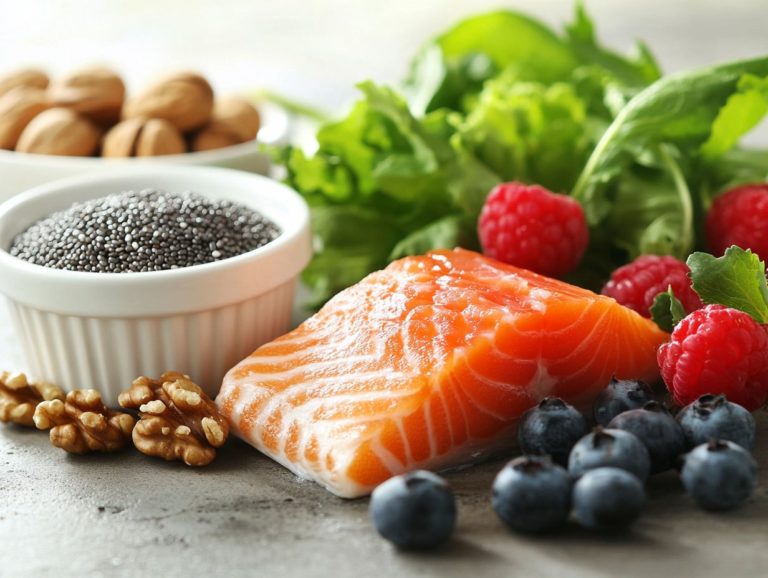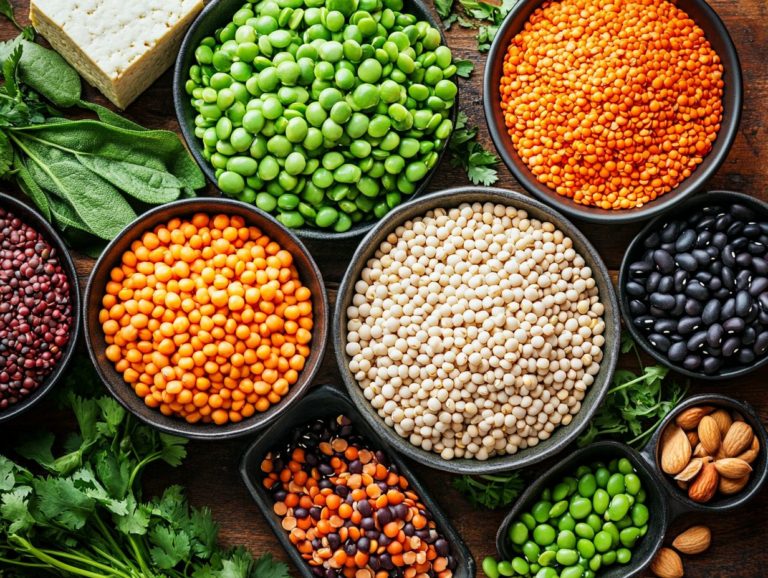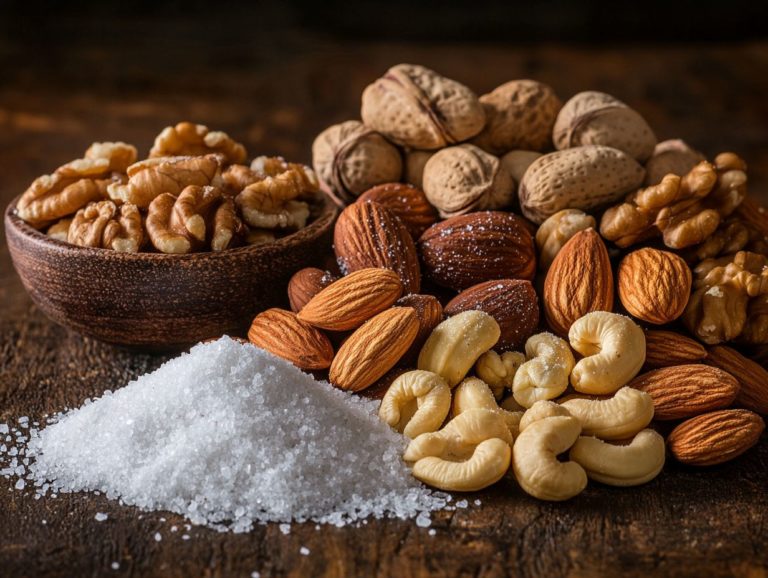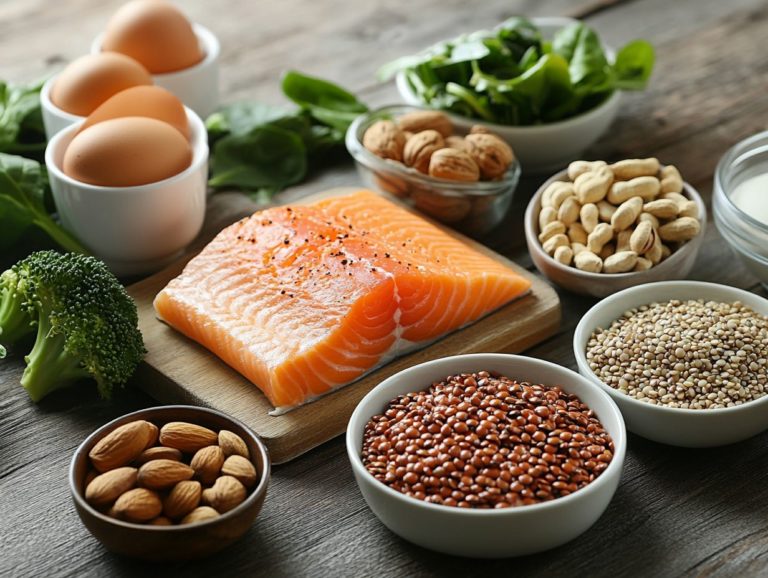5 Plant-Based Sources of Calcium
Calcium is an essential nutrient that is crucial for maintaining strong bones and teeth. However, if you re following a plant-based diet, securing an adequate intake can sometimes seem like a challenge.
This article delves into five exceptional plant-based sources of calcium, ranging from versatile tofu to nutrient-packed dark leafy greens. It also highlights the significance of calcium, outlines your daily needs, and offers tips for ensuring sufficient intake, particularly for children and pregnant women.
Discover exciting ways to nourish your body today while fully embracing a vibrant plant-based lifestyle.
Contents
- Key Takeaways:
- 1. Tofu
- 2. Dark Leafy Greens
- 3. Fortified Plant Milk
- 4. Almonds
- 5. Sesame Seeds
- Why Is Calcium Important for a Plant-Based Diet?
- How Much Calcium Do We Need and How Can We Get It From Plant-Based Sources?
- What Are the Other Nutrients That Help with Calcium Absorption?
- What Are Some Other Plant-Based Sources of Calcium?
- Can a Plant-Based Diet Provide Enough Calcium for Children and Pregnant Women?
- How Can One Ensure Adequate Calcium Intake on a Plant-Based Diet?
Key Takeaways:

Tofu is a versatile plant-based source of calcium, with 1 cup providing 86% of the daily recommended intake.
Dark leafy greens like spinach and kale are rich in calcium and other essential nutrients, making them an excellent addition to a vegan diet.
Fortified plant milk, such as soy, almond, or coconut milk, can be a convenient and delicious way to increase calcium intake.
1. Tofu
Tofu, a remarkably versatile and nutrient-rich food, is an essential part of your vegan diet. It offers a rich source of protein, calcium, and iron, all vital for maintaining a balanced lifestyle and promoting overall health.
There are various types of tofu silken, firm, and extra-firm each perfectly suited for different culinary adventures. Silken tofu blends seamlessly into smoothies or desserts, while firm varieties maintain their structure beautifully in stir-fries and salads.
As an excellent protein source, tofu contains all nine essential amino acids, making it an outstanding choice for anyone seeking plant-based proteins. Its calcium content is essential for bone health, and when enjoyed alongside vitamin C-rich foods, it can significantly enhance iron absorption especially important for those following a vegan diet.
Incorporating tofu into various meals can be both fun and delicious! You not only elevate the nutritional value but also introduce delightful textures and flavors that enrich your dining experience.
2. Dark Leafy Greens
Dark leafy greens, like kale and broccoli, are powerful allies in a vegan diet, offering a wealth of calcium essential for maintaining healthy bones. They work in harmony with vitamin D to ensure optimal nutrient absorption.
Incorporating these nutrient-rich vegetables into your daily meals is a breeze, whether you’re whipping up vibrant salads or crafting hearty soups. Varieties such as collard greens and Swiss chard also deliver impressive calcium levels while providing a variety of vitamins and antioxidants.
With their rich flavors and delightful textures, adding these greens elevates your meals and enhances your overall health. Regularly enjoying them can lead to stronger bones and may even support cardiovascular health.
Embracing these greens in your diet is a simple yet impactful step towards achieving a balanced and nutritious lifestyle.
3. Fortified Plant Milk

Fortified plant milk, such as soy and almond milk, plays a vital role in your vegan diet. These options enrich your meals with essential vitamins and minerals, particularly calcium and vitamin D, which are crucial for maintaining strong and healthy bones.
Beyond soy and almond, you have a delightful array of choices like oat, coconut, and rice milk, each bringing its own unique nutritional benefits. For instance, oat milk is known for its high fiber content, which can aid in digestion, while creamy coconut milk is a great source of healthy fats that support heart health.
Integrating these fortified options into your daily meals can be both simple and enjoyable. Whether you’re pouring oat milk over your morning cereal, blending almond milk into creamy smoothies, or cooking with creamy coconut milk in savory dishes, you can elevate your culinary experience.
Choosing fortified versions helps you meet your vital nutrient needs while indulging in a variety of flavors and textures.
4. Almonds
Almonds are packed with nutrients. They are also a superb source of calcium and omega-3 fatty acids, making them an invaluable addition to a balanced vegan diet that promotes overall health and wellness.
They are rich in vitamin E, magnesium, and fiber. These nutrients support heart health and digestion.
To effortlessly incorporate almonds into your daily meals, consider these creative options:
- Sprinkle them over salads
- Blend them into smoothies
- Use almond butter as a spread on whole-grain toast
These fun ways to use almonds make your meals tastier and reinforce your commitment to healthy choices, ensuring that nutritious options are always readily available.
5. Sesame Seeds
Sesame seeds are nutrient powerhouses, offering a remarkable dose of calcium and enhancing iron absorption. They are an essential component of your well-rounded plant-based diet, fostering a healthy lifestyle.
Sesame seeds also provide a wealth of healthy fats, protein, and antioxidants all of which contribute to your overall wellness. By incorporating these tiny seeds into a variety of dishes, you can effortlessly elevate both flavor and nutritional value.
Imagine sprinkling them atop fresh salads for a delightful crunch or blending them into rich sauces like tahini. Add sesame seeds to your baking or use them as a coating for meats and vegetables. They enhance your dishes while supporting bone health and boosting your energy levels.
They truly are a versatile ingredient that deserves a prominent place in your kitchen.
Why Is Calcium Important for a Plant-Based Diet?

Calcium is vital for healthy bones and teeth. Meeting your calcium needs helps you enjoy a vegan lifestyle without compromising your health.
This vital mineral also plays a significant role in muscle function, nerve transmission, and blood clotting, making it essential for your overall bodily functions. Insufficient calcium intake can lead to serious health risks, such as a condition that weakens bones, a heightened risk of fractures, and potential cardiovascular issues.
If you’re following a vegan diet, incorporating calcium-rich foods into your meals can help you maintain adequate calcium levels. Consider including:
- Fortified plant-based milks
- Leafy greens
- Tofu
- Almonds
Pairing these foods with sources of vitamin D can enhance calcium absorption, equipping you to support your skeletal structure while enjoying a diverse array of delicious, plant-based dishes.
How Much Calcium Do We Need and How Can We Get It From Plant-Based Sources?
Know your calcium needs on a vegan diet. You can easily achieve adequate intake through specific plant-based sources and fortified foods that align with your nutritional requirements for optimal health. Calcium is crucial for bone health, muscle function, and nerve signaling.
- Children need around 1,000 mg per day.
- Teenagers may require up to 1,300 mg.
- Adult women typically need about 1,000 mg daily, increasing to 1,200 mg for those over 50.
You can meet these needs by incorporating a diverse selection of nutrient-rich foods into your meals, such as:
- Tofu, which often provides a significant dose of calcium per serving
- Fortified plant milks that deliver the same benefits as cow’s milk
- Lively dark leafy greens like kale and bok choy, which you can easily toss into salads or blend into smoothies
Start incorporating these foods now for better health!
What Are the Other Nutrients That Help with Calcium Absorption?
Several nutrients enhance calcium absorption. Vitamin D is essential for bone health and should be included in your plant-based diet.
Vitamin D helps your body absorb calcium effectively. Don’t forget magnesium; it helps convert vitamin D into its active form.
Leafy greens and nuts are rich in both calcium and magnesium. Together, they improve nutrient availability and support long-term bone health.
What Are Some Other Plant-Based Sources of Calcium?

You can find various plant-based sources of calcium beyond tofu and enriched plant milks. Leafy greens, nuts, and legumes offer healthy options.
For example, add almonds to your morning smoothie for a calcium boost. Broccoli is a must-have in stir-fries or as a steamed side dish!
Beans are versatile and can enhance salads, soups, or spreads with nutrients. Dried figs make a sweet addition to oatmeal, boosting calcium and flavor!
Can a Plant-Based Diet Provide Enough Calcium for Children and Pregnant Women?
A well-planned plant-based diet can meet calcium needs for children and pregnant women. This supports their health and development.
To reach your calcium goals, enjoy a variety of nutrient-dense foods. Leafy greens like kale, enriched plant milks, and juices are key!
Legumes, almonds, and tofu not only boost calcium but also provide essential nutrients. For children, introduce a range of snacks and meals featuring these foods.
Pregnant women should choose enriched products that support fetal growth and overall well-being.
How Can One Ensure Adequate Calcium Intake on a Plant-Based Diet?
Ensuring you get enough calcium on a plant-based diet requires some planning and the inclusion of a variety of calcium-rich foods, including fortified options, to support healthy bones and overall well-being.
By exploring diverse sources, you can craft balanced meals tailored to your tastes and nutritional needs. Tossing leafy greens like kale and bok choy into your salads or smoothies delivers a calcium boost and essential vitamins.
Adding legumes, such as chickpeas and lentils, to your soups or stews enhances flavor while increasing your calcium intake. Don’t overlook fortified plant milks or yogurts; these options can easily elevate the calcium content of your breakfasts or snacks.
Let s not forget about snacking! Incorporating almonds or a tahini spread on whole-grain bread provides both crunch and nourishment. Variety is essential, allowing you to get creative in the kitchen while ensuring your bones stay strong and healthy. Your bones will thank you!
Frequently Asked Questions
What are 5 plant-based sources of calcium?
The 5 plant-based sources of calcium are leafy greens, tofu, almonds, fortified non-dairy milk, and sesame seeds.
Are plant-based sources of calcium as effective as dairy sources?
Yes, plant-based sources of calcium can be just as effective as dairy sources. Calcium from plant sources is more easily absorbed by the body and contains additional nutrients that can aid in calcium absorption.
How much calcium do these 5 plant-based sources provide?
The amount of calcium varies for each source, but typically 1 cup of leafy greens provides 200-300 mg of calcium, 100 grams of tofu provides 350 mg of calcium, 1 ounce of almonds provides 75 mg of calcium, 1 cup of fortified non-dairy milk provides 300-400 mg of calcium, and 1 tablespoon of sesame seeds provides 90 mg of calcium.
Can these plant-based sources of calcium be consumed by those with lactose intolerance?
Yes, plant-based sources of calcium are a great alternative for those who are lactose intolerant. They are naturally lactose-free and do not cause any digestive issues.
Are there any other benefits to consuming these plant-based sources of calcium?
Yes, in addition to providing calcium, these plant-based sources also provide other essential nutrients such as vitamin K, magnesium, and potassium. They also have a lower environmental impact compared to dairy sources.
Can these plant-based sources of calcium be included in a vegan or vegetarian diet?
Yes, these plant-based sources are suitable for both vegan and vegetarian diets. They are excellent options for those looking to increase their calcium intake without consuming animal products.
Explore recipes and tips to incorporate these calcium sources into your diet!

